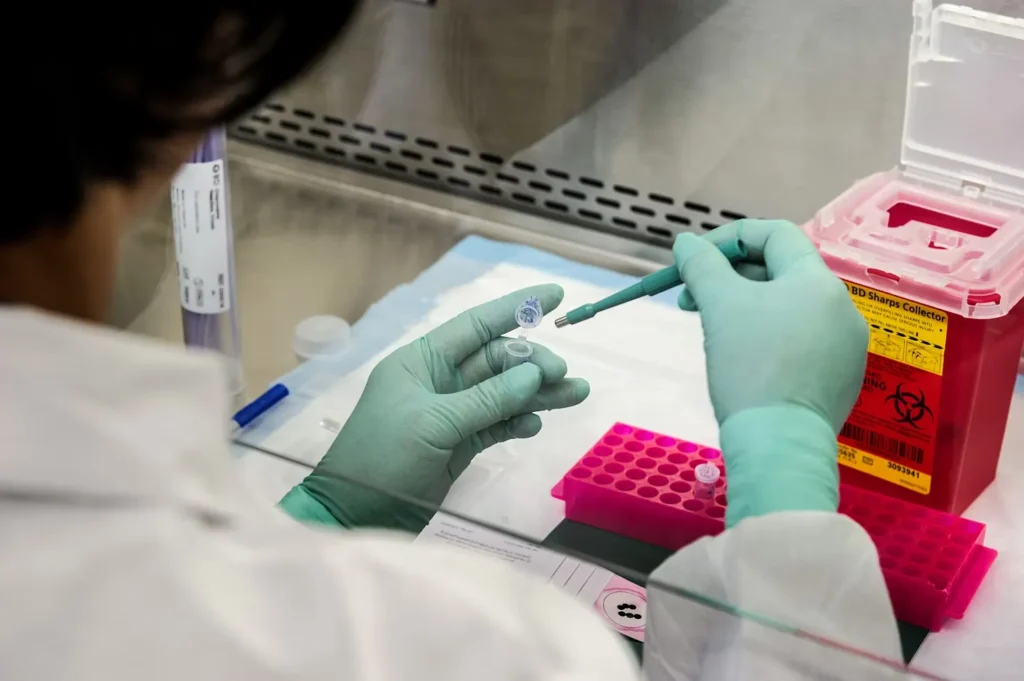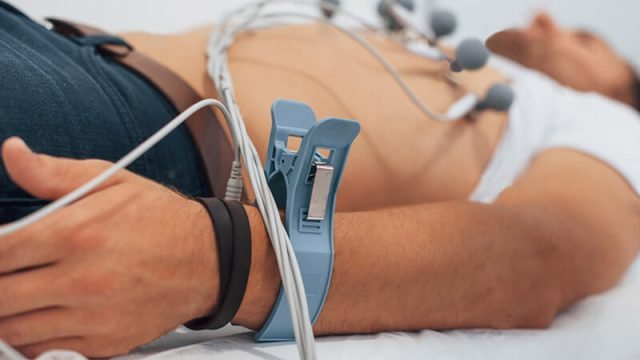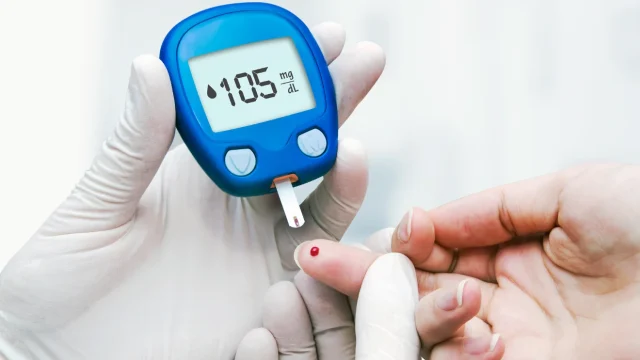Millions of people are at risk of Sexually Transmitted Diseases (STDs) and Sexually Transmitted Infections (STIs) globally due to ignorance and lack of timely treatment. Therefore, it is crucial to have timely and accurate testing for effective treatment and prevention of complications.
Anyone sexually active is at potential risk for a sexually transmitted infection (STI). Moreover, the risk is greater if the persons concerned don’t use protection,
STD Test involves providing samples of blood, urine, or other bodily fluids. It’s quick, painless, and an essential part of taking care of yourself.
STIs or sexually transmitted infections don’t always have symptoms so they often go unnoticed. Consequently, complications occur due to a lack of knowledge and treatment. This may lead to infertility, and sexually transmitted disease (STD).
In this comprehensive guide, get answers to how an STD test works, what to expect during an STD exam, STD tests for females and STD STI screening.
What are STD tests?
In simple terms, STD tests are medical tests that are used to detect sexually transmitted diseases and infections. Additionally, these tests identify the presence of bacteria, viruses, or parasites that cause STDs. STD tests are crucial for:
- Early Detection
- Prevention
- Health Maintenance
- How to Get an STD Test
To get an STD test, you can take the following steps:
- Ask Your Doctor for specific STD tests during your visit.
- Visit an Urgent Care Clinic
- Use At-Home Test Kits to collect samples at home and send them to a lab for analysis.
However, consulting with a healthcare provider for the best advice and treatment options is advisable. Moreover, untreated STDs can cause devastating and long-term health problems including blindness, brain damage, infertility, birth defects, and even death.
What to Expect During the STD Testing Process
STD testing process involves the following steps:
- Consultation: Here you need to discuss sexual history, symptoms, and concerns with a healthcare provider. The doctor may ask about the number of sexual partners, types of protection used, and any symptoms.
- Sample Collection: Next the doctor will collect blood, urine, or swab samples and send them to a laboratory for analysis.
- Physical Examination: During this, the doctor checks for visible signs of infection (sores, rashes, discharge. A pelvic exam is a must for females.
- Results: The time of reports varies depending on specific tests. The doctor suggests treatment and notifying partners.
- Follow-Up: Follow-ups include medication, additional testing, and notifying sexual partners.
Common Types of STD Tests
Different STD tests depend on the type of infection being tested for. Here are some common methods used in STD and STI testing:
- Blood Tests: A qualified laboratory technician takes Blood samples to detect infections such as HIV, syphilis, and hepatitis B and C. The blood is drawn from a vein in your arm and sent to a laboratory for analysis.
- Urine Tests: For STIs chlamydia and gonorrhoea, your urine sample is collected and sent for testing. Moreover, this detects the presence of viruses and it is a non-invasive technique for diagnosing these STIs.
- Swab Tests: Swab samples are taken from various body parts, such as the cheek, genital area, throat, or rectum and then tested for infections like chlamydia, gonorrhoea, HPV, and herpes.
- Physical Exams: At times the healthcare provider conducts a physical examination to check for signs of infection, such as sores, rashes, or unusual discharge. Your doctor will have a look at your genital area to check for symptoms like warts, sores, rashes, and more. Then take a swab.
- Pap Smear: It is a common test used for females to detect HPV and cervical changes indicating the presence of an infection or cancer. In this test, cells are gently scraped from the cervix and examined under a microscope.
What Is an STD Screening?
An STD screening procedure helps detect the presence of sexually transmitted infections in the body. Consequently, STD screening tests can identify various STIs, including chlamydia, gonorrhoea, syphilis, HIV, herpes, human papillomavirus and (HPV).
Additionally, screenings are essential for sexually active individuals to ensure early detection and treatment. Thus, it ensures prevention and the spread of infections and potential health complications.
What Can Prompt an STD Screening Test?
STD screening may be needed if you fall under the following conditions:
- Sexual Activity: If you are sexually active you should consider regular screening. Screening is essential for detecting infections like HIV, gonorrhoea, and chlamydia. Women should also be tested for gonorrhoea and chlamydia as they can be asymptomatic.
- Unprotected Sex: If you are having physical relationships without a condom, it increases risk. Therefore, testing is recommended..
- Riskier Relationships: Sometimes frequent testing is needed. In situations when your partner has a chronic infection (e.g., HIV, hepatitis B/C) or if you’re in an open relationship.
- High-Risk Sexual Behavior: Engaging in physical relationships with sex workers increases exposure. Also, IV drug users, same-sex relationships, and multiple partners are at higher risk.
- Past Infections: If you had an earlier infection, the risk increases.
- Baby Boomers: People who are born between 1945 and 1965 should be tested for hepatitis C.
- Symptoms: If you notice suspicious symptoms, you should go for immediate testing.
STD Tests For Females
To have a happy life, sexual health is a vital part of every woman’s life. Therefore, STD testing for females offers peace of mind and prevents complications. If you are concerned about STDs, a test is the only way you can find out whether you are infected. Here are some common tests for STD screening in females:
- Pap Smear: This particular test helps to detect HPV and cervical cancer. Generally, women start at age 21 and can be done during a routine gynecological exam.
- Swab Tests: In this test samples from the cervix, vagina, or rectum are collected with swabs. Laboratory tests determine infections like chlamydia, gonorrhoea, and trichomoniasis.
- Blood Tests: Screenings for HIV, syphilis, and other bloodborne infections are conducted through blood tests.
- Urine Tests: These tests help to check for chlamydia and gonorrhoea.
How often should women get tested for an STD?
Women should ideally undergo STD testing once a year. Also, if you are in a relationship with multiple partners, testing should be done once a month. Moreover, frequent screening is the best way to know if someone has an STD, including HIV. Common tests for females:
- Rapid Plasma Reagin Test or RPR test for Syphilis
- HSV IgG Test and HSV IgM Test for Herpes
- Polymerase Chain Reaction or PCR, Western Blot, and ELISA Test for HIV
- Hepatitis B Surface Antigen Test
- HVC Antibody Test
- Nucleic Acid Amplification Technology or NAAT for Gonorrhea and Chlamydia
- Cervical sample testing
- Urinary Analysis Test
What Is STD and STI Screening?
In simple terms, STD and STI screening refers to the process of testing individuals for infections transmitted through sexual contact. Also, these infections can be due to bacteria, viruses, or parasites. They may include conditions such as chlamydia, gonorrhoea, syphilis, HIV, herpes, and human papillomavirus (HPV).
Therefore, STD STI Screening helps in the early detection of these infections. Consequently, allowing for timely treatment and reduces the risk of complications.
Why Is Screening Important?
Regular screening for STDs and STIs is crucial for several reasons:
- Early Detection: Sometimes Many STDs and STIs are asymptomatic in their early stages. So, timely screening helps detect these infections early, making treatment more effective.
- Prevention of Spread: Timely identification and treatment reduces the risk of transmitting them to sexual partners.
- Health Complications: If left untreated STDs can lead to severe health problems, including infertility, organ damage, and cancers.
- Peace of Mind: Screening gives peace of mind, reduces anxiety and prompts responsible sexual health practices.
Who Should Get Screened?
STD STI Screening depends on factors such as age, sexual activity, and risk factors. People should consider regular STD and STI screening under the following conditions:
- Sexually Active Individuals who have multiple partners.
- Pregnant Women to prevent transmitting infections to the baby.
- Individuals with Symptoms should get screened.
Types of STD and STI Tests
There are various methods used to screen for STDs and STIs, depending on the type of infection. Common tests include:
- Blood Tests: Used to detect infections such as HIV, syphilis, and hepatitis. A blood sample is taken and analyzed in a laboratory.
- Urine Tests: Often used to detect chlamydia and gonorrhoea. A urine sample is collected and tested for the presence of bacteria.
- Swab Tests: Samples are collected from the genital area, throat, or rectum using a swab. These samples are tested for infections like chlamydia, gonorrhoea, HPV, and herpes.
- Physical Exams: A healthcare provider may perform a physical examination to look for visible signs of infection, such as sores or rashes.
- Pap Smears: Used to detect HPV and cervical changes in females. Cells are collected from the cervix and examined under a microscope.
Conclusion
After reading this blog you now have a fair idea why STD and STI screening is a vital part of maintaining sexual health. Also, you now understand that regular screenings help detect infections early, ensuring timely treatment and reducing the risk of complications.
So, if you’re experiencing symptoms, have multiple sexual partners, or simply want peace of mind, getting screened is a responsible and proactive step.
If you have any questions or concerns about STD and STI screening, consult with a healthcare professional.
Therefore, prioritise your sexual health with regular STD and STI screenings at Apollo Clinic Ulubari’s Sexology Clinic. We offer fast, confidential services with results available within 4-6 hours, and immediate treatments for infections like chlamydia and gonorrhea.
Additionally, if you have symptoms, multiple partners, or just want peace of mind, our affordable packages cater to all your needs.
Take a proactive step towards your well-being—book your appointment today and consult with our healthcare professionals to maintain your overall health. Contact us now to schedule your confidential screening test at Apollo Clinic Ulubari and get the peace of mind you deserve.











